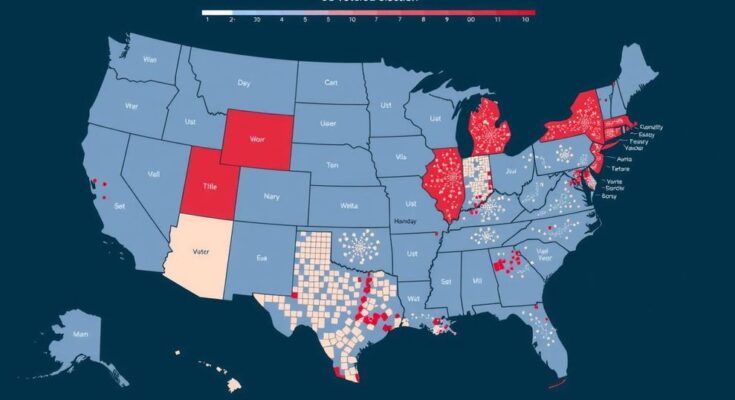Seven critical swing states—Arizona, Georgia, Michigan, North Carolina, Nevada, Pennsylvania, and Wisconsin—are pivotal in U.S. elections due to their fluctuating support for political parties over time. Both parties have concentrated their efforts here, as recent polling indicates tight races, reflecting diverse demographics and shifting political affiliations that make these areas crucial for electoral success.
As the U.S. prepares for the elections, seven key swing states—Arizona, Georgia, Michigan, North Carolina, Nevada, Pennsylvania, and Wisconsin—play a crucial role in determining the outcome. Historically, these states have shifted between Republican and Democratic candidates, with variations in allegiance across decades. Previously solidly Republican states like Arizona and Georgia have transitioned towards a more competitive landscape, as seen in recent elections. Presently, polling indicates tight races in each of these states, showcasing their pivotal importance for candidates seeking accumulation of electoral votes necessary for a presidential victory. Arizona, once a Republican stronghold, witnessed a significant shift in 2020 when it narrowly voted for Biden, ending a long streak of Republican support. Georgia similarly flipped Democratic but has traditionally favored Republican candidates, with Trump winning in prior elections. North Carolina and Nevada have shown fluctuating trends but have leaned Republican in recent contests, with both parties working fervently to secure their voter bases. Pennsylvania stands out as a critical battleground, having historically leaned Democratic, yet Trump managed an upset victory in 2016. Michigan and Wisconsin too, once dominated by the Democratic party, are now fiercely contested, with Trump’s surprising 2016 wins marking a shift in political dynamics. Overall, these states are characterized by diverse demographics and evolving political affiliations, making them vital to the electoral map in the quest for the White House.
In the United States, swing states, or battleground states, are those that do not consistently vote for one political party, making them central to election strategies. The states under examination—Arizona, Georgia, Michigan, North Carolina, Nevada, Pennsylvania, and Wisconsin—have seen varied voting patterns over the years. Understanding their electoral history is essential for candidates as they navigate the complex landscape of voter preferences and demographic changes in the lead-up to elections.
The analysis of the voting behaviors in these seven swing states highlights their unpredictable nature and significance in elections. As both political parties mobilize their resources to secure victories in these areas, their historical voting trends and recent changes reflect the evolving political landscape of the United States. The outcome in these key states may very well determine who secures the presidency.
Original Source: www.aljazeera.com




